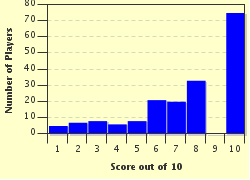Quiz Answer Key and Fun Facts
1. Starry-eyed, utopian, unrealistic
2. Blithesome, festive, gleeful
3. Omnipresent, universal, pervasive
4. Loquacious, voluble, verbose
5. Foggy, faint, shadowy
6. Instructive, instructional, educational
7. Delusory, faulty, spurious
8. Deceitful, guileful, underhand
9. Fickle, mercurial, volatile
10. Self-evident, unquestionable, undeniable
Source: Author
kino76
This quiz was reviewed by FunTrivia editor
ponycargirl before going online.
Any errors found in FunTrivia content are routinely corrected through our feedback system.


